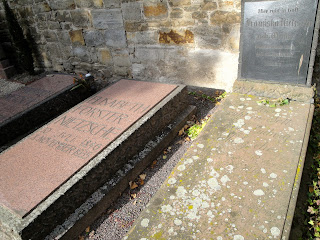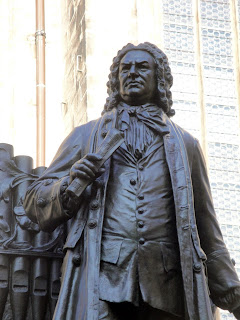I am sitting at a bus stop, on the ground, outside the town of Röcken. I wish I had my sunglasses, for the sky is clear again today and the sun shines so brightly that I'm thinking: "Fall was really the perfect time to come to Germany!"
A truck is coming by; the next vehicle might take a few minutes to come through. I am a stranger in a remote place. People turn their heads as if they never saw young women with dreadlocks and half a shaved head walk by with a big red backpack.
The next bus will come in a bit more than two hours.
A truck is coming by; the next vehicle might take a few minutes to come through. I am a stranger in a remote place. People turn their heads as if they never saw young women with dreadlocks and half a shaved head walk by with a big red backpack.
The next bus will come in a bit more than two hours.
So after I am done with this writing, I might stick out my thumb and see if I couldn't hitch a ride to Weissenfels, from where I can then take train back to Leipzig (It takes about an hour). I wonder if anybody would stop.
I am here because I came on a small pilgrimage to visit Nietzsche's birthplace, and to lay a flower on his grave.
There is nothing else in Röcken; it is a lost little settlement in the middle of nowhere.
I like it a lot!
There is nothing else in Röcken; it is a lost little settlement in the middle of nowhere.
I like it a lot!
 |
| Quite a sober resting place for such an imminent personality. |
I wondered what feelings might take me when I'd finally get here.
Nietzsche has been one of the main influences on my thinking since I first read his Genealogy of Morals, nine years ago. It is not too much to say - some of you can attest to this - that, since that day, my whole existence has pretty much unfolded as an experiment in following that which streams from my understanding and opinion of his work. It is, of course, my own idiosyncratic experiment. There can be no single exegesis of Nietzsche's legacy. And so I set out to produce my own.
 |
| Rest in Peace. Danke schön. |
I am but a simple seeker and lover-of-wisdom, privileged enough to travel here and pay my homage to one of the most important thinkers in history.
Thus I sat next to the marble tombstone and prayed outloud to his soul and spirit. I thanked him for his courage, and I wished for him to rest in peace. I asserted how loved he is, by many of us, and asked his spirit to forgive us our inability to see and use whatever love he had to share with humanity.
Thus I sat next to the marble tombstone and prayed outloud to his soul and spirit. I thanked him for his courage, and I wished for him to rest in peace. I asserted how loved he is, by many of us, and asked his spirit to forgive us our inability to see and use whatever love he had to share with humanity.
He suffered so much. He was so alone. I can understand how he could have been so merciless and desperate in his words.
He was meant to destroy the old tablets in order for us to come closer to the Source/Truth. He was far from perfect. Nobody is.
 |
| Friedrich is buried next to his whole family: his sister, mother, and father. What a trip, to think that he stood there once, perhaps crying on his father's grave... |
In silence, I took a walk on the streets of Röcken. And by "in silence" I mean that the entire village actually seemed deserted. It took me fifteen minutes to go through everything; four of five paved streets, a couple dozens of houses, a handful of fruit trees and some chickens. I saw one woman come out of her house; she didn't return my greeting.
I wonder what people mean when they talk about small conservative German villages. (I wonder what kind of conversation could come out around topics like "polyamory" or "queer". I think we'd probably agree on a lot of issues of "bioregional politics" ,"sustainability", or even "over-population".
Nietzsche only lived here for the first six years of his life (1844-1850). His father was still alive then; he served as a Lutheran minister for the area. I wonder how Röcken looked back then. I wonder how small was that tree I saw next to the church, 171 years ago!
Now I am going back to Leipzig, where I shall go find some rest in the cozy home that my two lovely Leipziger hosts have opened to me, "the couch surfer".
Leipzig
Revolutions to Revolutions...
Leipzig
Revolutions to Revolutions...
 |
| Two of my hosts' friends offered to spend the day with me! Bless! |
L. and J. are an adorable couple in their early twenties. They were born and raised in Leipzig, and they love their city. "It is not so diverse," says L., "but there are a lot of great places and people here." From my impression, Leipzig is perhaps to Berlin as Québec city is to Montréal. It is not too big, not too busy, not too cosmopolitan, but there is a strong sense of history and a lot of beautiful architecture. The University of Leipzig was built in 1409 (It was the second in Germany). It covers the epicenter of the city; and one might easily argue that constitutes the very heartbeat of the city.
 |
| A student takes in some Sun in between two classes. The place, MoritzBastei, stands as the last remnant of the old medieval wall... |
 |
| Today, it hosts the most vibrant social spot in Leipzig! |
It takes about twenty-five minutes to stroll around and see most of the touristic/historical landmarks of the city. The most famous - according to the numbers of phototourists I witnessed today!- is St.Thomas Church. The reason Leipziger are so proud of their Church, is that a former [Ba]Rock star by the name of J.S. Bach apparently worked there as Cantor during the last twenty-seven years of his life. It is the site of his burial, and of pilgrimage.
wikinterestingdetails:
The St. Thomas Church dates back to the 12th Century. It was here in 1409 that the University of Leipzig was founded. From 1492 to 1496, the church had the form of a late Gothic hall church. It was also here in 1539 that Martin Luther preached the implementation of the Reformation. For the last 800 years, the St. Thomas Boys Choir has been singing here. Today, visitors from all over the world come to Leipzig to observe church services in the St. Thomas Church, hear a motet from the St. Thomas Boys Choir, or to take pleasure in concerts and organ music.
A few hundred meters from there, there is another famous Church! It is St.Nikolai's Church (1165), this one known for the "Leipzig Demonstrations."
"[...] the demonstrations began on 4 September 1989 after the weekly Friedensgebet (prayer for peace) in the Nikolaikirche, and eventually filled the nearby downtown. Safe in the knowledge that the Lutheran Church supported their resistance, many dissatisfied East German citizens gathered in the court of the church, and non-violent demonstrations began in order to demand rights such as the freedom to travel to foreign countries and to elect a democratic government.
Informed by (West German) television about the events, people in other East German cities begun repeating the Leipzig demonstration, meeting at city squares on every Monday evening. On Oktober 9th, 1989, 70,000 people gathered in peaceful protest, at St.Nikolaikirche. Three weeks later, they were 320 000 people. They were, of course, surrounded and confronted by "military units."
That's why I wanted to travel to the capital of Saxony, because I thought there might be something to this place: cradle of both the Reformation and of the Leipzig Protests!
I am fascinated with all of this: history, revolutions, utopias, peoples' movements. I am dumbfounded to see how these black and white pictures portray the such similar images as the ones we see today, on the internet: the people versus the police/army.
Aren't they supposed to protect the people? Aren't they supposed to be peace agents?
I hear that Greece is going to remain within the European Union. And I think to myself...
What would Nietzsche do?
Remembering the destruction of the Great Synagogue of Leipzig, during the Kristallnacht. |
------------------------
At Nietzsche’s Grave
By
Antonio Foggi (Italy)
By
Antonio Foggi (Italy)
All “wanted to save Nietzsche”,
Those who lived in his time,
Those who lived after,
And all those who ever
Will have anything to do with him.
Those who lived in his time,
Those who lived after,
And all those who ever
Will have anything to do with him.
That “fool” by the name of George
Once said, concerning him:
“He should have sung [….], not spoken …”,
He should have been a poet, not a philosopher.
Once said, concerning him:
“He should have sung [….], not spoken …”,
He should have been a poet, not a philosopher.
I, “a worse fool” than he,
 I have dedicated a simple reflexion to him,
I have dedicated a simple reflexion to him,
That I had made for myself:
I love the color red,
Both the color of communism
And of Love,
Two Things
That I miss terribly
In our times.
 I have dedicated a simple reflexion to him,
I have dedicated a simple reflexion to him, That I had made for myself:
I love the color red,
Both the color of communism
And of Love,
Two Things
That I miss terribly
In our times.
Thus,
Also now, I do not know
If one has to save you
From hell, from purgatory,
Or from paradise,
But I know certainly
That it would already have meant a great deal,
Indeed, a tremendously great deal,
If you would have returned from your infamy
And pain-stricken fate
In order to love the world
And its people.
Also now, I do not know
If one has to save you
From hell, from purgatory,
Or from paradise,
But I know certainly
That it would already have meant a great deal,
Indeed, a tremendously great deal,
If you would have returned from your infamy
And pain-stricken fate
In order to love the world
And its people.
Rest in peace
so far you may reach,
My poor friend.
so far you may reach,
My poor friend.









Did you know that that you can make cash by locking special pages of your blog or site?
ReplyDeleteSimply open an account with AdWorkMedia and run their Content Locking widget.